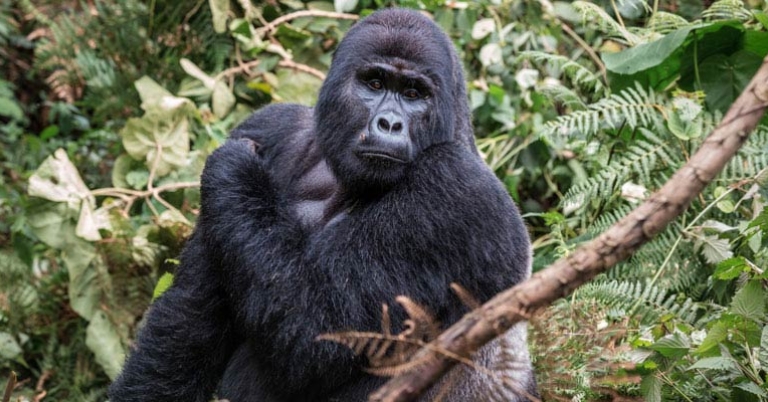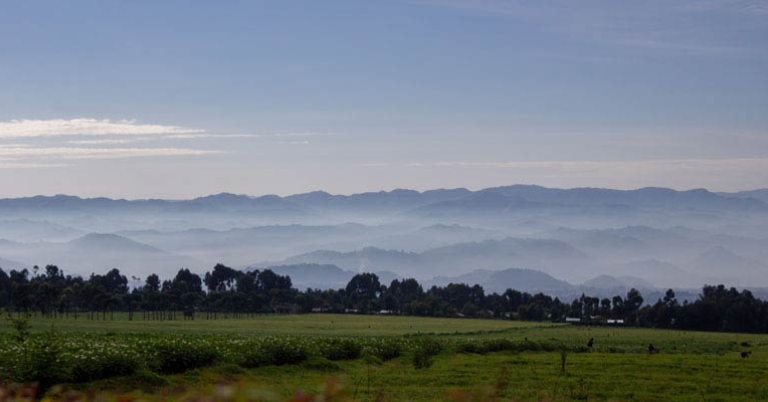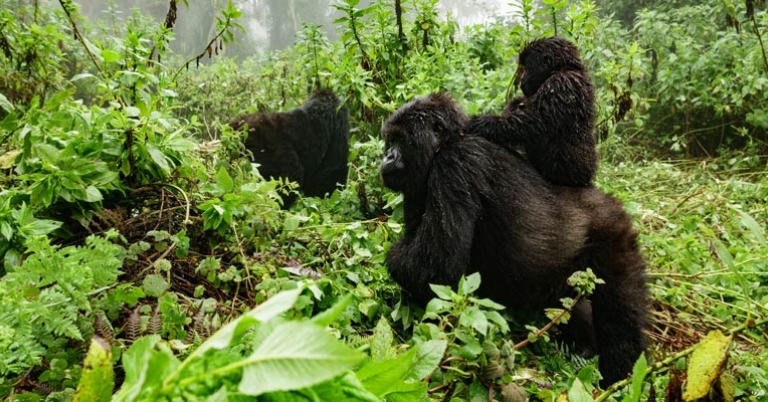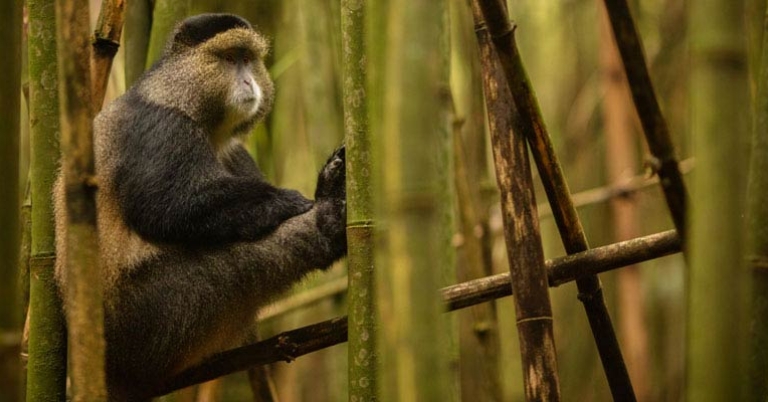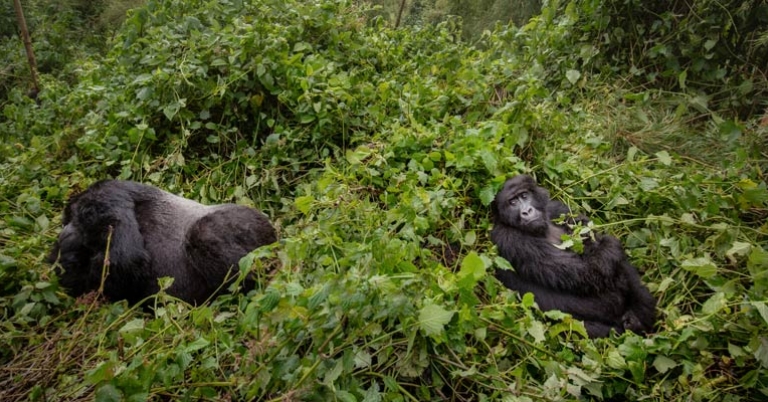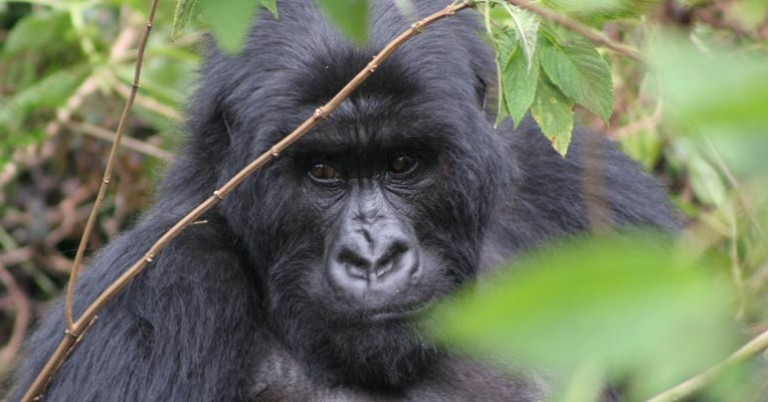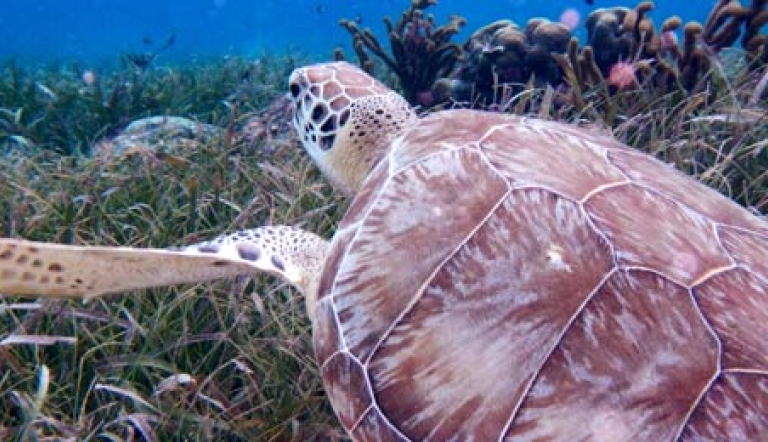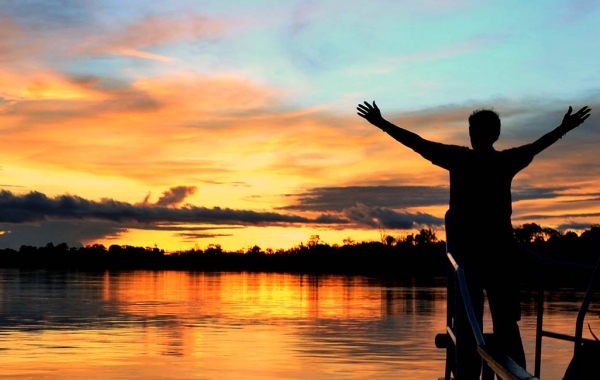About this trip
Extend your Tanzania adventure with this unique experience exploring the incredible landscape, culture, and wildlife of Rwanda. Discover the remarkable biodiversity of this "Land of a Thousand Hills," along with the history of Rwanda's people and culture. Meet groups of wild mountain gorillas up close and learn why this is an internationally renowned conservation success story. Benefit from the extensive experience of professional gorilla trackers to gain a new understanding of the mind of one of our closest living relatives.
NOTE: This is an optional pre-trip extension for Cindy Cone's 'Tanzania | Photography Safari' June 1-12, 2026.
Highlights
- Journey into Volcanoes National Park, chronicled in Dian Fossey's Gorillas in the Mist, to track and observe endangered mountain gorillas in their natural habitat.
- Visit the Kigali Genocide Memorial and learn about the cultural and political shifts that led up to the Genocide against the Tutsi in 1994 and the steps Rwanda has taken to permanently honor the victims of these violent events.
- Track the rare Golden Monkey and spend time observing their behavior and complex family dynamics in a bamboo forest.
Meet your host
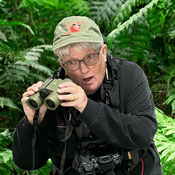 Cindy Cone
Cindy Cone
$7,615
Per person
About this price
Land cost only. Does not include round-trip airfare to and from destination.
Single room supplement $1225
What makes us different
Cultural Discovery
Value for your money
Rich content
Support local communities
Low stress travel planning
Service anytime
Daily Itinerary
Print ItineraryDepart
Kigali
Volcanoes National Park
Volcanoes National Park
Volcanoes National Park
Kigali
Pricing
Print Pricing$7,615
Per person
About this price
Land cost only. Does not include round-trip airfare to and from destination.
Single room supplement $1225
What's Included
- Airport transfers
- Full time naturalist guide/driver for duration of the program
- Accommodations with private bathrooms
- Activities and meals as mentioned in itinerary
- Private transportation for tours and transfers
- Non alcoholic beverage with meals
- Internal flights relevant to itinerary
- Carbon Offset
What's Not Included
- International flights
- Items of a personal nature and tips.
- Travel Insurance
Pricing Details
A non-refundable deposit of $1700 is required by participants to register and reserve a space on the program. Reservations made less than 95 days prior to departure require full payment. Due to the special nature of Gorilla trekking permits and accommodations in Rwanda, inventory is limited and is not guaranteed until minimum group size is achieved. The deposit deadline is November 21, 2025. Please contact us as soon as possible. Once deposited, this amount is non-refundable unless Holbrook cancels the departure due to under enrollment or any other reason. In that case, deposit monies are fully refundable.
Holbrook Travel strongly recommends the purchase of travel protection for medical emergencies while traveling and to protect your investment. Please note the purchase of Cancel for Any Reason Coverage or to exclude pre-existing conditions with Trip Cancellation coverage may require policy purchase within 10-14 days of your initial deposit, depending upon the provider.
Single room supplement $1225
Final payment due date: February 22, 2026
Travel Info
Print Travel InfoEntry & Exit Requirements
U.S. citizens must have a valid passport to enter Rwanda. Passports must be valid for at least six months after the date of entry and have at least one blank page available for the entry stamp.
A tourist visa is also required for entry into Rwanda. Visas can be obtained at the airport upon arrival. The fee for a 30-day tourist visa (single entry) is USD $50, and the fee for a 90-day tourist visa (multiple entry) is $70. Credit cards are generally accepted at the Kigali International Airport but are not accepted at some land borders. It is recommended that individuals travel with enough cash in U.S. dollars to cover the visa costs in case credit card transactions are not available at the time of arrival.
If you are not traveling with a U.S. passport, please check with the Rwandan Embassy for the requirements based on your nationality.
Health Information
Immunizations
The Centers for Disease Control recommends that all travelers be up to date on routine vaccinations such as measles-mumps-rubella (MMR) vaccine, diphtheria-pertussis-tetanus vaccine, varicella (chicken pox) vaccine, polio vaccine, shingles vaccine, and your yearly flu shot before every trip.
There are no vaccinations required for entry into Rwanda, unless you are traveling from a country where yellow fever transmission is a risk, in which case proof of yellow fever vaccination is required.
Though not required for entry, the CDC recommends inoculation against hepatitis A, hepatitis B, and typhoid for most unvaccinated travelers to Rwanda.
Please consult your physician for additional information and recommendations based on your individual circumstances.
Malaria
The CDC warns that travelers to Rwanda may be at risk for exposure to malaria. Malaria is caused by a parasite found in Anopheles mosquitos, which are active from dusk until dawn. Prevention is twofold: the use of anti-malarial drugs and the prevention of insect bites. If you choose to use an anti-malarial drug, as recommended by the CDC, see your physician for a prescription.
To protect against mosquitos, the CDC recommends that you cover exposed skin with lightweight, long-sleeved shirts and pants, consider treating clothes with permethrin, and use an insect repellent containing an EPA-registered active ingredient like DEET, picaridin, or oil of lemon eucalyptus (OLE). Apply sunscreen first, followed by the repellent, ideally 20 minutes later.
Be careful when applying products containing DEET, as it can damage or dissolve certain synthetic fabrics as well as plastic, rubber, vinyl, or elastic materials, such as those used in camera equipment, binoculars, phone cases, sunglasses, or watches. Additionally, some research suggests that when DEET and picaridin enter local waterways, they can be harmful to amphibians and other wildlife. When selecting a repellent, it is ultimately up to each traveler to weigh the risks and benefits of different options, keeping in mind both environmental factors and the importance of protecting against illness.
Other Vector-borne Illnesses
In addition to malaria, the CDC warns that travelers may be at risk for other illnesses transmitted by mosquitos or ticks, such as dengue fever and African tick-bite fever. Travelers are advised to protect themselves against bites using the measures noted above.
After spending time outdoors, especially in grassy or wooded areas, the CDC recommends showering and conducting a full-body check for ticks. If you find a tick attached to your skin, safely remove it as soon as possible.
Wildlife
Follow all instructions from your guides regarding wildlife. Animals may become aggressive to protect themselves, their young or their mates, or to guard a food supply. Do not make sudden movements either toward or away from them, as this may be interpreted as threatening or territorial. Avoid stray dogs, as they may carry rabies. In the unlikely event of being bitten, clean the wound and control bleeding. Seek medical attention immediately.
Parasites & Bacteria
Avoid swimming or bathing in freshwater lakes or rivers. Some freshwater bodies contain disease-causing parasites or bacteria that may be contracted through contact with infected water.
Sun Exposure
The effects of the sun can be damaging to the eyes and skin. Spending time outdoors exposes you to the sun’s harmful ultraviolet (UV) rays, even on cloudy days. To protect yourself from the sun, use a broad spectrum sunscreen of at least SPF 15, protect skin with clothing, wear a wide-brimmed hat and sunglasses, and drink plenty of fluids.
Altitude Sickness
At elevations above 5,000 feet, altitude sickness is a possibility. Stay hydrated and well-rested, and avoid heavy, fatty foods and alcohol in the days before arrival. Consult your physician prior to travel for advice specific to your situation.
Travelers’ Diarrhea
The CDC warns that travelers’ diarrhea is one of the most common travel-related illnesses worldwide. Consumption of contaminated food and water may cause diarrhea. To avoid this, do not drink tap water, and use bottled water to brush your teeth. Avoid ice and uncooked vegetables or fruit without a peel. When in doubt, ask your guide. Restrict yourself to cooked food at restaurants, and avoid food sold on the streets. If you contract diarrhea, it is important to drink large quantities of purified water. Consult your doctor for appropriate medication should you experience diarrhea.
Respiratory Illness Protocols
Please review our Respiratory Illness Protocols page, which explains our policy and procedures if you or another traveler should develop symptoms of a respiratory illness during your trip. Your participation in a Holbrook Travel program indicates that you are in agreement with these protocols.
Resources
Print ResourcesSuggested Packing List
Everyone has personal preferences when it comes to packing; for this reason, the information below is offered as a general guide and not a definitive list. You know yourself best: Use your discretion and pack what you think will serve you, based on your personal preferences and specific itinerary.
You may find many of the items below in the New Headings Gear Store. Use code HolbrookGuest10 for a 10% discount on your purchase.
CLOTHING
Bring enough clothing suitable for the length of your program. If you prefer to pack light, note that many hotels offer laundry services at additional cost. If you plan to hand-wash items, remember that humidity may delay drying time.
Pack clothing that can be worn in layers to adapt to weather changes throughout the day. Clothing that wicks away moisture and dries quickly is recommended. Casual, safari-style clothing is suitable for most activities. Rwanda's rainy season is September to November and March to May.
Bring clothes in neutral or muted colors such as green, khaki, brown, or gray. We recommend that you avoid wearing bright colors or white as they can easily be spotted by animals. It is prohibited for civilians to wear army-style camouflage.
- A combination of short-sleeved and lightweight, quick-drying long-sleeved shirts for sun and insect protection; long sleeves are recommended for gorilla treks to provide protection against vegetation
- Shorts or skirts (knee-length or longer)
- Lightweight, quick-drying long pants for sun and insect protection; long pants are recommended for gorilla treks to provide protection against vegetation
- Undergarments
- Sleepwear
- Jacket or sweater/sweatshirt
- Bathing suit(s) – Some hotels have pools.
- Socks – Bring extra pairs.
- Shoes – For gorilla treks, we strongly recommend a pair of comfortable, sturdy, water-resistant or waterproof hiking shoes or boots with good ankle support. In addition, you may want a pair of comfortable, closed-toe walking shoes for around town. Many participants also opt for a pair of sturdy sport-strap sandals (e.g. Keens, Tevas, or similar) and/or casual flip-flops, sandals, or slip-ons for around the hotel.
- Lightweight rain jacket, hooded poncho, and/or windbreaker
- Visor or wide-brimmed sun hat
- Bandana, scarf, or neck gaiter
- Leather, gardening-type gloves (for gorilla treks)
Personal Toiletries
Pack toiletries based on your personal preferences and habits. Below are just a few recommendations to keep in mind.
- Shampoo, conditioner, lotion, deodorant/antiperspirant , etc. – If possible, avoid strong fragrances.
- Soap and washcloth or a small, quick-drying microfiber towel – Washcloths are not standard in all hotels. If you normally use a washcloth, you may wish to bring one from home.
- Hairbrush, comb, hair ties, shower cap
- Toothbrush and toothpaste
- Razor
- Ear plugs, especially if you are a light sleeper
- Personal hygiene products
- Insect repellent
- Sunscreen and lip balm with SPF
- A travel pack of tissues – also useful as napkins or toilet paper if needed
In addition to your personal toiletries, it is useful to pack a small medical kit, which you can easily prepare. Helpful items might include: bandages, antihistamine, a pain reliever, motion sickness and/or altitude sickness medication (if you are prone to either), anti-diarrhea medicine, powdered electrolyte packets to prevent dehydration, aloe vera gel to treat sunburn, individually wrapped pre-moistened towelettes and/or hand sanitizer, antibiotic ointment, anti-fungal cream, moleskin for blisters, eye drops, tweezers, a mini sewing kit, and an extra pair of disposable contact lenses or eyeglasses if you wear them.
Days before you leave home, you may wish to consider spraying any clothing, socks, and shoes that will be worn in lowland, tropical sites with permethrin, an anti-parasite medication, to repel irritating pests and prevent the spread of disease. A recommended brand is Sawyer. Carefully read all instructions before use. Please note permethrin is highly toxic to cats and fish, and some aerosol products may be harmful to birds. Side effects may include minor itching, burning, or redness. You may want to use a laundry marker to label and keep track of which socks are permethrinized. Only one application per item is necessary; permethrin on treated clothes remains effective through several washings. Permethrin should NOT be applied directly to skin.
Miscellaneous
Remember to pack valuables such as your passport, cash/credit cards, and medications in your carry-on luggage.
- Passport, visa (obtained on arrival), and photocopies of all travel documentation
- Yellow fever certificate, if applicable (only required if traveling from a country where yellow fever transmission is a risk)
- Personal insurance card and travel insurance information
- Money – ATM/credit card and/or cash; small bills in good condition are recommended
- Prescription medicines (if applicable), with a copy of the prescription
- Sunglasses with strap
- Small day pack for hikes and excursions
- Flashlight and/or head lamp
- Travel alarm clock or inexpensive waterproof wristwatch with alarm – Not all hotels provide alarm clocks.
- A pocket calculator or phone to assist with conversions and currency exchange
- Binoculars with lens cleaner
- Camera and related equipment, such as charger, lenses, and extra memory cards
- Reusable water bottle
- Non-perishable snacks
- Pocket-knife or multipurpose tool – Pack in your checked luggage.
- Reusable zip-top style bags – useful for packing toiletries, sorting clothing, storing damp or muddy shoes, or as a dry bag for protecting electronics
- Notepad or travel journal and pen
- Music or reading material for down time, long bus drives, or on the airplane, and a portable bright light to read by
- Trekking poles or collapsible walking stick with rubber tip – Pack in your checked luggage.
- A small quantity of laundry detergent if you’ll be washing clothing by hand
- Money belt
- Chargers for electronics
- Converter and adapter
Plastic bags
Due to Rwanda's ban on plastic bags, travelers are not permitted to bring plastic bags into the country. This includes garbage bags and grocery/shopping bags. Zip-top style bags specifically used to carry toiletries per TSA’s liquids rule are still permitted on the assumption that they will be reused on the return flight. Items purchased at the airport before boarding the aircraft should be removed from plastic bags. Please double-check your carry-on luggage before disembarking in Rwanda; any plastic bags should be left on the plane to avoid delays and possibly fines.
Luggage Weight Restrictions
Pack lightly. Charter flights have a baggage weight limit of a maximum of 30 lbs. If your bags are heavier, it is likely you will be required to pay an excess luggage fee. For this reason, soft bags are preferable to hard suitcases.
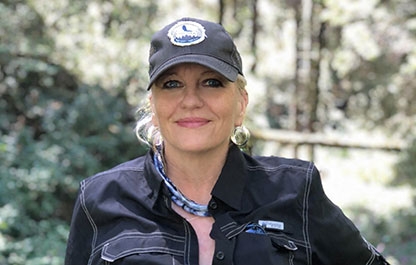
Questions
Contact Lisa Palmese-Graubard at 800-451-7111 x339 or lisa@holbrooktravel.com.
